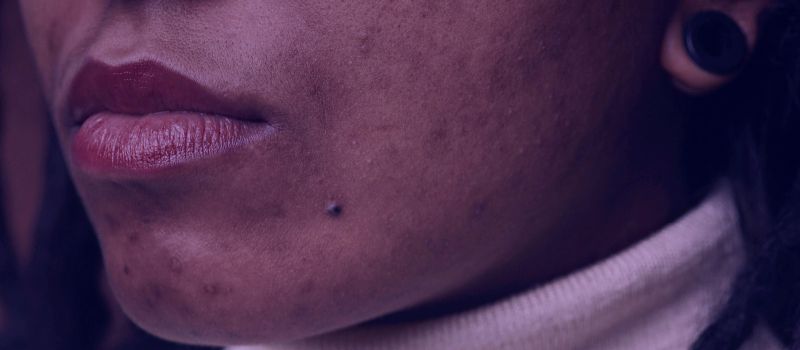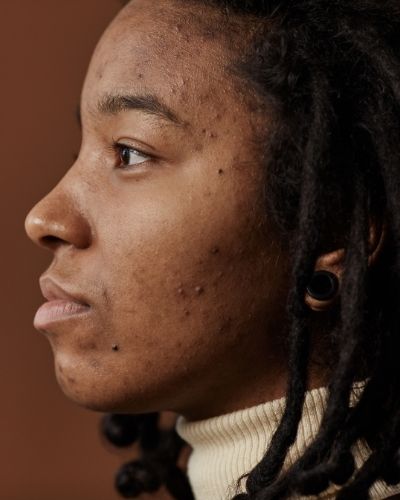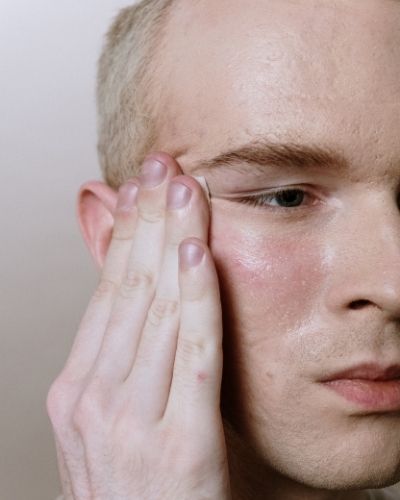Acne scarring is a common concern for many people who are dealing with acne.
And although there are many treatments to help improve this annoying consequence that results from severe inflammation, we’ve all seen those before and after Reddit posts of people who have been on Accutane for a few months and their skin seems to be looking flawless.
Which begs the question can Accutane help with acne scarring besides getting rid of the acne itself?
Well, the answer is a little more complicated than that.
Accutane can, in fact, get rid of some acne scarring, but this depends more on how your skin heals and bounces back after the inflammation has subsided and not really on the medication itself.
Therefore, in this article, we will discuss what Accutane is and what does it do, as well as share some tips on how to minimize acne scarring while on Accutane.

What Does Accutane Do?
Accutane, also known as isotretinoin, is an oral medication that’s prescribed to treat severe acne.
It is a derivative of vitamin A that works by reducing the size of the sebaceous glands, which are the glands that secrete oil into our hair follicles.
And since this oil can sometimes be the culprit of acne due to clogging our pores and serving as food for the C.acnes strain of bacteria, reducing it will help to reduce inflammation and acne.
Accutane is considered the nuclear weapon against acne and due to its strength, it’s usually only prescribed when other treatments, such as topical creams or antibiotics, haven’t worked.
Will Accutane Help With Acne Scarring?
Accutane can be effective in reducing scarring, but how well your skin recovers depends entirely on your skin’s ability to heal and bounce back after inflammation has subsided.
Some people’s skin seems to recover better and shows very little scarring even after severe acne, while for others this isn’t the case and many of us are left with a combination of different types of scarring after acne has healed.
In general, however, Accutane can help improve the appearance of acne scars by:
- Reducing inflammation.
- Stimulating collagen production.
- Increasing cellular turnover.
These effects can help to improve the overall appearance of your skin and make your scars less visible.
Can Accutane Cause Scarring?

Accutane alone is unlikely to cause scarring; however, some people may experience scarring after using Accutane because, although the medication will reduce active acne, it won’t do much for what’s left after acne has healed.
This means that the scarring left on the skin after Accutane results from acne, not from the medication itself.
With that said, there are ways to protect your skin from scarring, and although these methods aren’t guaranteed to work for everyone, they can still be helpful for the skin.
Tips for Minimizing Acne Scarring While on Accutane
Here are three useful tips to help minimize acne scarring while on Accutane:
Focus on Repairing Your Skin Barrier
One of the best ways to protect your skin from scarring is to make sure you’re taking care of your skin barrier.
A damaged skin barrier will likely have a more difficult time healing from inflammation and is likely to scar easier, so repairing it is the first thing you need to focus on to prevent scarring while on Accutane.
This means using gentle, non-irritating skincare products that contain soothing, nourishing, and barrier-repairing ingredients.
Some barrier-repairing ingredients to look for in skincare products include:
- Ceramides
- Cholesterol
- Squalane
- Niacinamide
- Panthenol
- Shea butter
- Zinc
- Centella Asiatica
Avoid Exfoliating Your Skin
Exfoliating your skin can be a great way to remove dead skin cells and improve the overall appearance of your skin; however, if you’re on Accutane, it’s best to avoid this step.
Since Accutane can cause dryness and irritation, exfoliating your skin will only make these symptoms worse.
Additionally, Accutane will speed up cellular turnover, so instead of removing matured and dead skin cells from the skin’s surface, you will end up removing the immature cells, instead, and this will likely lead to severe irritation and barrier damage.
Instead of exfoliating products, opt for gentle, hydrating facial masks that will help nourish your skin while on Accutane.
Wear High SPF Daily
Wearing high SPF while on Accutane is essential because the UV rays can worsen hyperpigmentation and post-inflammatory redness left from acne.
Additionally, sunscreen can also help prevent new acne scars from forming.
Furthermore, since Accutane can make your skin more sensitive to sunlight and prone to burning, it’s important to protect your skin when going outside.
A physical sunscreen with an SPF of 30 or higher is ideal for people on Accutane.
Best Topical Treatments for Acne Scarring

Topical treatments are unlikely to improve pitted scarring left from acne, such as ice pick, boxcar, or rolling scars.
This type of scarring forms when there is a loss of collagen at the site of injury, and topical treatments can’t penetrate deep enough into the skin to stimulate enough collagen production to fill the indentations and even out the skin’s surface.
However, some topical treatments can improve the type of acne scarring that manifests on the skin as discoloration, such as post-inflammatory hyperpigmentation and post-inflammatory erythema (redness.)
Some of the best topical treatments for discolored acne scarring include:
- Retinoids
- Hydroquinone
- Tranexamic acid
- Kojic acid
- Vitamin C
- Niacinamide
- Azelaic acid
Best Professional Treatments for Acne Scarring
Professional treatments are an excellent option to repair pitted acne scarring, and it usually takes a few sessions of these to see drastic improvement or complete reduction.
Some of the best professional treatments for acne scarring include:
- Microneedling
- Microchanneling
- Laser resurfacing
- Intense Pulsed Lighting
- Chemical peels
- Microdermabrasion

My name is Simone and I am a certified skin specialist. I created this website to teach my readers how to take great care of their skin and I also like to occasionally share my honest opinions on skincare products I’ve tried. You can learn more about me here.
